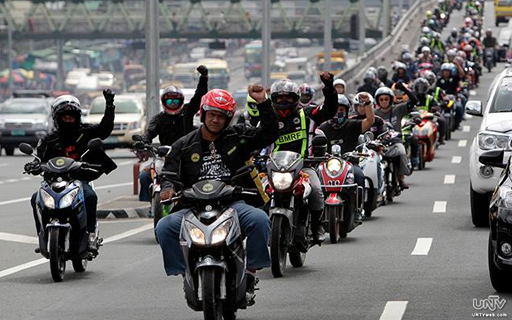
The unfulfilled promise to end contractualization and the runaway
inflation due to the imposition of TRAIN led to an outbreak of labor disputes
in 2018 and the forging of a historic unity among workers’ groups in the
country. According to the latest data from the National Conciliation and
Mediation Board (NCMB), there were 21% more notices of strikes from January to
August this year compared to the same period last year. Of the nine actual
strikes recorded, five of them involved issues of regularization of workers.
Spurred by the resurgence in workers’ militancy, the country’s
rival labor groups finally came together in a joint mass action in the Labor
Day commemoration this year. The coalition Nagkaisa, which comprise some 40
labor groups and institutions, joined forces with the Kilusang Mayo Uno in a
massive May 1 march from Espana to Mendiola. The disparate labor groups once
more came together, along with other social movements and civil society
organizations, in the United People’s Action during the State of the Nation
address of President Duterte. Formally coming together as Manggagawa Ayaw sa
Diktadura, the rival labor organizations marched again as one to slam the
threat of a new dictatorship during the commemoration of the declaration of
martial law last September 21.
While statistics from the NCMB show that actual strikes were down from
15 to just 9 (January to August this year compared to last year), the
government’s data is inaccurate. To cite just one example, it does not include
the strike last May at the Dong Seung garments factory in the Cavite ecozone. The
Dong Seung strike is the latest in a string of disputes and struggles at the
country’s biggest ecozone in the last four years. As a result, a dialogue
finally started this year between labor groups, the DOLE and the Philippine
Ecozone Authority to guarantee respect for freedom of association.
As the latest NCMB data covered only August, it does not list the
biggest strike this year. On September 28, workers of Philip Morris Fortune
Tobacco in Marikina and Vigan went on strike for more than one month against
mass layoff and job outsourcing. Undoubtedly
many of the disputes and majority of the actual strikes involve
contractualization.
The Department of Labor and Employment (DOLE) announced in its
yearend report that some 400,000 workers were regularized this year. If it were
true, it is most welcome. Unfortunately the data is suspect as it has not been
independently verified. The DOLE based its figures from reports by companies
which obviously have an interest in bloating the numbers. It was also not
reported if the workers were made regular in the principal companies or just in
the manpower agencies.
What is undeniable is that the DOLE’s own compliance orders to
regularize workers in the country’s biggest companies have not been implemented.
Worse, it has led to mass termination of workers. Last October the DOLE NCR
regional office released an order to regularize some 2,600 contractual workers
in dozens of agencies used by Philippine Airlines and PAL Express. The order
has been appealed by management and has not been complied with. A similar order
early this year on the telco giant PLDT to regularize 7,300 endo employees was
defied through the termination of service contracts with 39 contractors and
thus the retrenchment of the workers.
In the face of a spike in prices, a wave of wage hikes were
ordered by different regional wage boards in the country. The increases however
were below the amount needed to recover the lost purchasing power of workers’
wages. To cite an example, the P25 hike in Metro
Manila is short by 30% to make up for the P35.84 erosion in wages due to the average
7% inflation in the NCR. Partido Manggagawa’s own cost of living estimate for a
family of five in Metro Manila is around P1,300 a day, more than double the new
minimum wage of P537. This continues the pattern of worsening inequality—real
wages are stagnating despite the 50% productivity growth from 2001 to 2016.
The coming new year under the neoliberal and
bloody policies of the Duterte administration does not augur well for the
working class. On the heap of the broken promises of ending endo and abolishing
regional wages, the workers should develop their own power through unity and
action. The challenge for the workers movement in 2019 is to build upon the
resurgence of militancy and the forging of labor unity to make the popular
clamor for change a reality.
December 29, 2018
